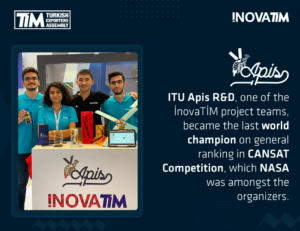
Portulans staff interviewed Global Innovation Index partner, Mr. İsmail Gülle, Chairman of the Turkiye Ihracatçılar Meclisi (the Turkish Exporters Assembly, TIM), about the Turkey’s digital transformation and innovation culture. How does Turkey stay ready for the digital future? Read our Network Readiness Analysis of Turkey.
What steps does Turkey take to foster an ‘innovation culture’?
Turkey has a promising economy with a bright future. It is expected to become the fastest-growing economy among the OECD members. Over the last decade, Turkey’s GDP has grown significantly, prompting the government to increase its R&D spending: from 0.53% of GDP in 2002 to 1.06% in 2019. Turkey’s 2023 Industry and Technology Strategy document looks to the future, with a goal to increase the share of R&D investments to 1.8% of GDP by 2023.
Turkey’s R&D capabilities should be viewed as the key for the country’s transformation. To that end, Turkey has made considerable investments to shift its economy in that direction. A specific law on the support of R&D activities came into effect in March 2008: accordingly, the government provides special investment incentives (in the form of tax exemptions, cuts, and financial support to improve the technological competitiveness and innovation capacity of vital industries). The law also provides fiscal incentives for R&D by the private sector, and for projects supported by public agencies and international institutions.
Another key tenet of Turkey’s innovation culture is the Technology Development Zones Law (enacted in 2001), which has led to the establishment of over 85 ‘techno-parks’ since. These techno-parks host thousands of start-ups and more than 50,000 employees.
Turkey’s Promising Track Record in Network Readiness, Innovation: Read the Portulans analysis.
What about the Turkish Exporters Assembly: what steps do you take to support innovation?
TIM has conducted various innovation projects to foster innovation culture in Turkey for several years. Firstly, InovaLEAGUE is designed to find Turkey’s innovation champions from the five main areas of innovation: strategy, organization and culture, life-cycle management, enabling factors and results. Every year, InovaLEAGUE champions receive awards at the Türkiye Innovation Week. Learn more about InovaLEAGUE.
Another project is the InoSuit Innovation-Focused Mentorship Program, which is based on university-industry cooperation. It aims to increase innovation management competence in companies part of TIM. One of the program’s main goals is creating strategic, organizational and cultural infrastructure as well as instructions, in order to cultivate the processes and results of innovation. Learn more about the mentorship program.
Thirdly, TIM-TEB Start-Up Houses bring entrepreneurs together with public and private sector investors, thanks to TIM’s strong relations with parties involved. This project organizes the Start-Up to Corporate (S2C) events to enable companies to purchase start-up products and services, and to develop cooperation between the parties. The TIM-TEB Start-Up Houses were a national winner for Improving the Business Environment in the European Enterprise Promotion Awards (EEPA) in 2019, among other special mentions. The EEPA nomination was very exciting, as it showed Turkish startups can be competitive on the global stage. Learn more about the TIM-TEB Start-Up Houses.
Finally, InovaTIM – the youngest and most progressive innovation ecosystem in Turkey – is designed to educate university students about innovation, intellectual capital, the economics of the information age, and entrepreneurship. InovaTIM participates in major events and summits internationally, and participates in national events like Türkiye Innovation Week and Teknofest.

Tell us about the most recent Türkiye Innovation Week.
TIM has organized ‘Türkiye Innovation Week’ in Istanbul since 2012, to contribute to the development of innovation and an entrepreneurial culture (in coordination with the Ministry of Trade). Türkiye Innovation Week is a platform with government institutions, companies, academics, and domestic and foreign professionals from innovation and tech-based industries.
The 8th Türkiye Innovation Week was held online between 25-26 December 2020, due to the pandemic. It was hosted with the participation of President Recep Tayyip Erdogan and six government ministries, and presented to the world a line-up of famous speakers, industry giants, owners of groundbreaking technological inventions and innovation stakeholders. Innovation projects – from the TIM-TEB Enterprise House, in addition to InovaLEAGUE, InoSuit and InovaTIM – shared their success stories.
How does Turkey’s talent ecosystem drive innovation?
To ensure the success of Turkey’s talent transformation in driving innovation, we need a common focal point for collective, concerted actions. It is critical that all stakeholders – including businesses, associations, public institutions, educational institutions and individuals – take action.
There is already serious dynamism in all areas of the talent ecosystem to foster innovation. In particular, significant improvements have been made in intra-industry and cross-industry collaboration, although it is open to further development. Namely, industry collaboration should be further extended to corporations that are actively participating in funded projects with their suppliers, in order to develop the supplier landscape further. Currently, incentive schemes behind the techno-parks attract cross-industry collaboration and help combat the current sole focus on IT products and services. University-industry collaboration is also on the increase.
The ‘InovaTIM Artificial Intelligence, Innovation and Entrepreneurship Training in High Schools’ project should be considered best-practice. This project aims for high school youth to develop innovative, high value-added projects and represent Turkey in international competitions; it also receives ministerial support from the Ministry of National Education. Another aim of the project is to improve the ability of students to produce ideas and succeed collectively. At the end of the project’s first year, high school students had received a variety of achievements in team-building, generating ideas, developing projects, acting as a collective, finding support for their projects and participating in competitions. The innovative ideas they have created demonstrates this project is making consistent strides and achieving its original goal.
What might hinder Turkey’s innovation performance? What steps should Turkey take to improve this performance?
Although Turkey has now developed the institutions for a well-functioning innovation and entrepreneurship ecosystem, it has yet to develop to a more advanced stage. Turkey is highly motivated to improve its innovation track record, particularly through R&D initiatives, which offers opportunities for improvement.
Data shows there is a direct relationship between improving Turkey’s ranking in the Global Innovation Index (GII) and its overall economic performance. Turkey is committed to significantly improving its performance. As of 2020, Turkey was ranked in 51st place in the GII. ‘Innovation Roadmap’ studies – championed by the Ministry of Industry of Technology and TIM in coordination with the Board for the Improvement of the Investment Environment – aim to improve the position of Turkey in the GII 2021. This roadmap identifies 26 institutions responsible for spearheading innovation, who have each prepared short- and medium-term plans for innovation, coordinated and monitored by the TURKIZ platform.
How can digital transformation facilitate innovation?
Our chance to be competitive depends on achieving digitalization. We are in a period where digitalization is increasingly common. In order to improve our competitiveness, we should embrace the opportunities offered by digital technologies, particularly e-commerce. All sectors should renew their infrastructure with digital technologies, and strive to increase the digital skills of their employees. Digital transformation plays a role in the creation of new jobs and means of production: in other words, digital transformation is rapidly changing economic structures. Innovation is required for creating new digital products and services, and accelerates innovation.
Organizations that have digitally transformed innovate much more than – and differently from – their non-digital counterparts, and are better positioned to take initiative in innovation. Digitally innovative companies are much more likely to collaborate with external partners and participate in digital ecosystems. Additionally, cross-functional teams are another important source of digital innovation.
TIM has already begun its digital transformation. The Assembly is the upper organization of 13 general secretaries and 61 exporter associations, representing 1000,000 exporters at both the national and international level across 27 sectors. Brought together by the motto ‘Sustainability and Innovation in Exports’, TIM prioritizes digitization in exports, and the adaptation of blockchain technology to foreign trade, in addition to the development of e-commerce.
For exporters more generally, the ‘paper age’ has come to an end. Exporters are now able to monitor the whole exporting process from where they sit, using digital monitoring tools. Singapore, Dubai, South Korea, Sweden and the Netherlands successfully digitized their exporting methods. Now, Turkish exporting is beginning to be digitized.

What are some of the most exciting examples of digital transformation in Turkey right now?
Turkey is very ambitious in its digital transformation and has high potential. Some of the most exciting examples of digital transformation are:
- E-Government Gateway is the digital face of Turkey. It provides high-quality, integrated public services: a space where citizens can make their transactions rapidly and securely. This is especially important in the pandemic period. For example, by joining the Virtual Laboratory of the Council of Higher Education in a digital space, students attending universities offering distance learning can receive laboratory courses in physics and chemistry.
- Developments in connectivity are underway, as in April 2016, Turkey started using 4.5G, which is 10 times faster than 3G technology.
- Turkey attaches importance to smart cities, which offer high-quality air, zero waste, fast communication and transportation. The government has been conducting smart city projects with the support of local institutions; the Ministry of Industry and Technology signed a cooperation agreement with the Ministry of Environment and Urbanization and Istanbul’s Esenler district to establish a smart city in an 8 million-square-meter area. The project hopes to be the center for electric cars, autonomous vehicles, information technologies and software.
- Istanbul Airport is a ‘smart airport’, and hosts unique architecture, robust infrastructure and state-of-the-art technology. It was granted the ‘Best Digital Transformation in Europe’ award by the Airports Council International.
- Finally, the Turkish defense industry is digitally transformed, offering high-technology and cost-efficient solutions. The industry constantly improves its production infrastructure and experience in this field, resulting in innovations like unmanned aerial vehicle systems.
And how has the pandemic crisis impacted Turkey’s digital transformation trajectory?
Many sectors are changing at great speed, trying to keep up with the new demands of the Covid-19 crisis. Turkey has managed this process well. To build resilience, many companies have focused on how they can most effectively use their resources to undergo digital transformation. Throughout Turkey, corporate assets and stakeholder relationships alike have redefined themselves digitally.
Particularly in the health sector, mobile applications have been implemented to provide remote treatment. Online education was rapidly implemented with the ‘Channel EBA’ platform. Along with these digital transformations, the original concept of the ‘workplace’ has lost its importance, and online meetings have increased. Remote working has increased significantly, and the rise of IT has boosted employment in the service sector. Beyond Turkey, the country is following the European Union’s vision for recovery, considering sustainability and digital transformation. Read Portulans’ analysis of the EU’s recovery plan.



